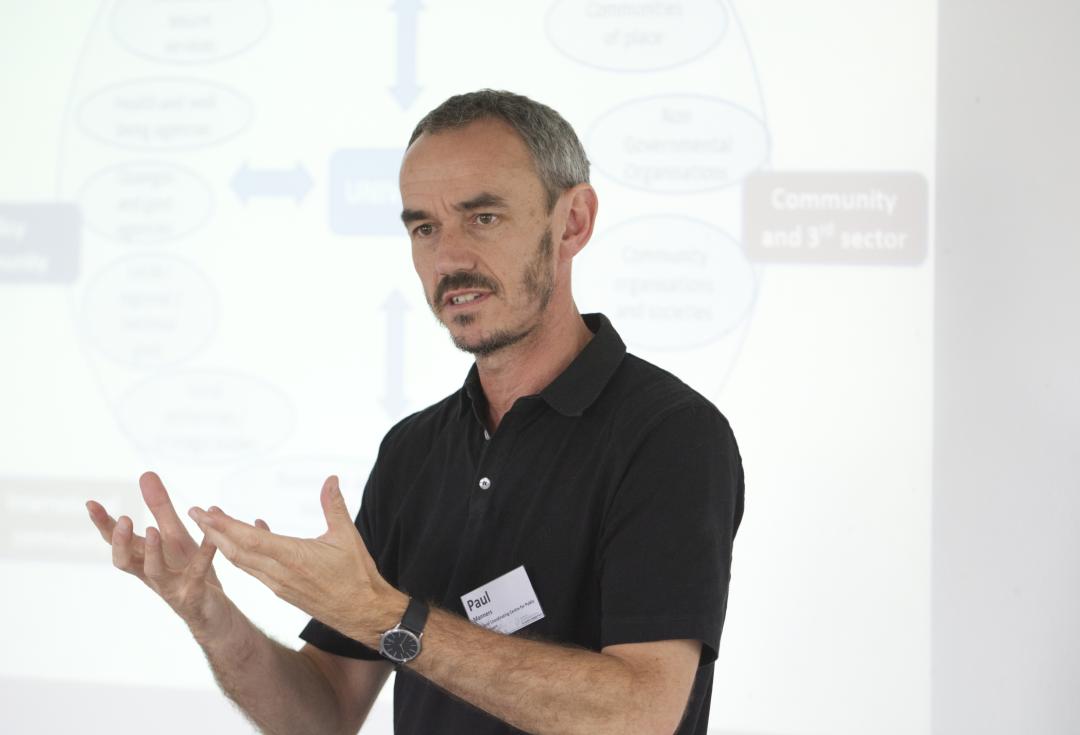
The policy and funding landscape for public engagement
The rise of public engagement: why has it become a policy priority, and how is it incentivised in university funding?

We know that when wider society is involved, research and innovation become more relevant and useful for everyone. For these reasons, a key priority for everyone working in research and innovation must be to forge deeper connections with wider society
The evolution of public engagement: five overlapping shifts
Since public engagement first emerged as a policy focus in the early 2000s, the external context for universities has shifted dramatically. COVID-19, the fall-out from Brexit, and increased focus on place-based inequality and on inclusion have moved public engagement up the agenda.
From an initial motivation to tackle declining trust in research, the agenda has broadened: the imperative to work in inclusive and socially engaged ways is now mainstreamed in policy and funding. The timeline provides an overview of some of the key developments.
2000 to present
Building public trust in research
A public backlash against GM crops galvanised a shift from promoting ‘public understanding’ to ‘public engagement with research’, to foster more responsive, sensitive and participatory practices.
This shift is gaining in momentum, with an increasing expectation that HEIs develop engaged and participatory approaches to research.
2010 to present
The rise of the Impact Agenda
The introduction of the assessment of research impact with the REF and Pathways to Impact in 2010 galvanised a step change in how external engagement is valued.
The latest iteration of the REF has accelerated this, with a new focus on the vital contribution of rigorous engagement to excellent research.
2018 to present
Civic: the rise of place
The Civic University Commission spot lit the vital contribution of universities to their places. Over 60 universities committed to creating Civic University Agreements.
This focus on the wider societal responsibility of universities was accelerated by the inequalities exposed by Brexit, COVID19 and Black Lives Matter and a political focus on levelling up
2020 to present
Culture moves centre stage
Wellcome’s reports on Research Culture in 2020 galvanised a step change in the attention paid to the research environment and to the need for a more ‘human-centred’ and inclusive culture in HEIs. This brought to centre stage the NCCPE’s culture change agenda.
2023 onwards
Inclusion and socially engaged practice
UKRI’s current strategy (‘Transforming Tomorrow Together’) and REF 2028 both signal a profound shift in the policy landscape.
Culture and engagement now constitute 50% of the quality profile in the REF. UKRI’s strategy identifies Engagement, Connectivity and Diversity as fundamental and urgent priorities.
Public engagement now: an embedded rather than ‘bolted on’ approach
In 2008, when the NCCPE was established, we were charged with bringing about a culture change in how universities supported high quality public engagment with research. For a number of years the NCCPE’s focus on culture change was relatively unusual. It helped to highlight some of the challenges in broader research culture, and now this focus on making research culture more open and engaged is a priority for all funders, giving much greater impetus to our culture change efforts.
Increasingly, funders are expecting meaningful public engagement to be built into the design of research and knowledge exchange – rather than treating it as a separate activity to be ‘bolted on’, often at the end of a project. Wellcome’s new focus on ‘Engaged Research’ foregrounds this expectation, as they move away from funding discrete public engagement interventions. UKRI’s new strategy outlines a similar expectation.
Public and Community Engagement is one of the 7 perspectives in the Knowledge Exhchange Framework in England. The Research Excellence Framework (REF) 2028 puts even greater emphasis on the development of open research cultures, and places a much more explicit focus on the importance of rigorous, expert engagement in the framing of the impact domain.
Public Engagement is much closer to being a mainstream activity in higher education – though there is still much to play for. We have pulled together a range of resources at the of this page to enable you to delve deeper into the current funding and policy landscape.
The future: creating more inclusive, open universities
As the demands for a more inclusive sector grow, Public Engagement is playing an increasingly significant role in both policy and practice.
So what might the future hold? Of course, much is uncertain, and the financial pressures bearing down on universities makes the progress to embed public engagement vulnerable. It will demand strong and committed leadership if it is to be provided the support it needs to flourish.
As we look ahead, it is important to avoid taking a fixed or dogmatic position about what public engagement is: rather, to focus on the outcomes it helps universities to realise, and to be flexible and responsive to the shifting political and social context in which HEIs operate.
At its core, public engagement reminds us how important it is to embed openness and inclusivity in our work. This requires a joined up, collaborative approach where Public Engagement professionals are working alongside senior managers, engaged researchers, knowledge exchange and impact professionals, community and civic engagement teams and external partners with one simple goal: to enable their institutions to contribute in increasingly purposeful and responsive ways to the needs of wider society.

Public engagement focuses attention on the imperative for universities to work in more open and inclusive ways to build and share knowledge.
This collaborative and curious mindset vitalises universities, motivates staff, stimulates innovation and makes a major contribution to enhancing the culture of research.